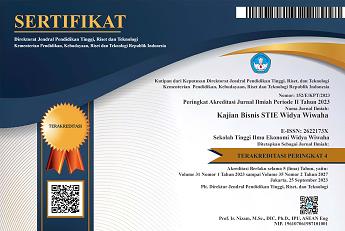NIAT BAIK YANG MENYESATKAN : PERAN TERSEMBUNYI KECOCOKAN ORGANISASI DALAM MENDORONG PERILAKU TIDAK ETIS DEMI ORGANISASI
DOI:
https://doi.org/10.32477/jkb.v33i2.1211Keywords:
komitmen afektif, fit to organization, unethical pro-organizational behavior, UMK, PLS-SEMAbstract
Penelitian ini bertujuan untuk menguji hubungan antara komitmen afektif (affective commitment/AC), kecocokan individu dengan organisasi (fit to organization/FO), dan perilaku tidak etis yang menguntungkan organisasi (unethical pro-organizational behavior/UPoB) dalam konteks usaha mikro dan kecil (UMK). Data dikumpulkan dari 153 responden yang merupakan karyawan UMK di Jawa Tengah melalui kuesioner terstruktur. Analisis data dilakukan menggunakan metode Partial Least Square (PLS) dengan bantuan SmartPLS 4.0. Hasil penelitian menunjukkan bahwa komitmen afektif berpengaruh positif dan signifikan terhadap fit to organization. Namun, baik pengaruh langsung komitmen afektif terhadap UPoB maupun pengaruh FO terhadap UPoB tidak signifikan. Temuan ini menunjukkan bahwa hubungan antara keterikatan emosional terhadap organisasi dan kecenderungan melakukan perilaku tidak etis tidak bersifat langsung, serta dipengaruhi oleh faktor lain yang belum tercakup dalam model. Studi ini memberikan kontribusi terhadap literatur mengenai perilaku tidak etis dalam konteks UMK serta menyarankan perlunya pendekatan multidimensi untuk memahami faktor pendorong UPoB.
Downloads
References
Allen, D. G., Peltokorpi, V., and Rubenstein, A. L. (2016). When “embedded” means “stuck”: Moderating effects of job embeddedness in adverse work environments. Journal of applied psychology, 101(12), 1670. http://dx.doi.org/10.1037/apl0000134.
Bahat, E. (2021). Person–organization fit and commitment to volunteer organizations. VOLUNTAS: International Journal of Voluntary and Nonprofit Organizations, 32, 1255-1270. doi:10.1007/s11266-020-00212-x
Blau, P. M. 1964. Exchange and power in social life. New York: John Wiley.
Cropanzano, R., & Mitchell, M. S. (2005). Social exchange theory: An Interdisciplinary review. Journal of Management, https://doi.org/10.1177/0149206305279602
Grabowski, D., Chudzicka-Czupała, A., Chrupała-Pniak, M., Mello, A. L., & Paruzel- Czachura, M. (2019). Work ethic and organizational commitment as conditions of unethical pro-organizational behavior: Do engaged workers break the ethical rules? International Journal of Selection and Assessment, 27(2), 193–202. https://doi.org/10.1111/ijsa.12241
Im, T., Campbell, J. W., & Jeong, J. (2016). Commitment Intensity in Public Organizations: Performance, Innovation, Leadership, and PSM. Review of Public Personnel Administration, 36(3), 219–239. https://doi.org/10.1177/0734371X13514094
Joo, B. K., Park, S. and Lee, S. (2021). Personal growth initiative: the effects of person–organization fit, work empowerment and authentic leadership. International Journal of Manpower, 42(3), 502-517. doi:10.1108/IJM-02-2020-0056
Jung, C. S., & Ritz, A. (2014). Goal Management, Management Reform, and Affective Organizational Commitment in the Public Sector. International Public Management Journal, 17(4), 463–492. https://doi.org/10.1080/10967494.2014.958801
Kristof, A. L. (1996). Person-Organization Fit: An Integrative Review of Its Conceptualizations, Measurement, and Implications. Personnel Psychology, 49(1), 1-49. doi:10.1111/j.1744-6570.1996.tb01790.x
Lee, J., and Pee, L. G. (2015). The relationship between online trust and distrust in business: Testing mutual causality from a cognitive-affective personality system theory. Asia pacific journal of information systems, 25(3), 500-518. https://doi.10.14329/apjis.2015.25.3.500.
Lee, J., Oh, S.-H., & Park, S. (2022). Effects of Organizational Embeddedness on Unethical Pro-organizational Behavior: Roles of Perceived Status and Ethical Leadership. Journal of Business https://doi.org/10.1007/s10551-020-04661-8
Meyer, J. P., & Herscovitch, L. (2001). Commitment in the workplace: Toward a general model. Human Resource Management Review, 11(3), 299–326. https://doi.org/10.1016/S1053-4822(00)00053-X
Meyer, J. P., Allen, N. J., & Smith, C. A. (1993). Commitment to organizations and occupations: Extension and test of a three- component conceptualization. Journal of Applied Psychology, 78(4), 538–551. https://doi.org/10.1037//0021 9010.78.4.538
Meyer, J. P., Herscovitch, L. (2001). Commitment in the workplace: Toward a general model. Human Resource Management Review, 11(3), 299–326. https://doi.org/10.1016/S1053-4822(00)00053-X.
Mischel, W., & Shoda, Y. (1995). A cognitive-affective system theory of personality: Reconceptualizing invariances in personality and the role of situations. Psychological Review, 102(2), 246–286.
Mowday, R. T., Steers, R. M., & Porter, L. W. (1979). The measurement of organizational commitment. Journal of vocational behavior, 14(2), 224-247. https://doi.org/10.1016/0001 8791(79)90072-1.
Peachey, J. W., Burton, L. J., & Wells, J. E. (2014). Examining the influence of transformational leadership, organizational commitment, job embeddedness, and job search behaviors on turnover intentions in intercollegiate athletics. Leadership & organization development journal, 35(8), 740-755. https://doi.org/10.1108/LODJ-10-2012-0128.
Piercy, C. W. and Carr, C. T. (2020). Employer reviews may say as much about the employee as they do the employer: Online disclosures, organizational attachments, and unethical behavior. Journal of Applied Communication Research, 48(5), 577-597. doi:10.1080/00909882.2020.1812692
Piercy, C. W., & Carr, C. T. (2020). Employer reviews may say as much about the employee as they do the employer: online disclosures, organizational attachments, and unethical behavior. Journal of Applied Communication Research, 48(5), 577– 597. https://doi.org/10.1080/00909882.2020.1812692
Rhoades, L., & Eisenberger, R. (2002). Perceived organizational support: a review of the literature. Journal of applied psychology, 87(4), 698. https://doi.org/10.1037/0021-9010.87.4.698.
Stazyk, E. C., Pandey, S. K., & Wright, B. E. (2011). Understanding affective organizational commitment: The importance of institutional context. American Review of Public Administration, 41(6), 603–624. https://doi.org/10.1177/0275074011398119
Umama, H. A., Setyawati, S. M., & Wulandari, S. Z. (2024). The Paradoxial Effect of Affective Commitment on Unethical Pro-Organizational Behavior: Evidence from Indonesian MSEs. Journal of Logistics and Service Science,11(7),117-136. doi:10.33168/JLISS.2024.0707
Umphress, E. E., Bingham, J. B. and Mitchell, M. S. (2010). Unethical behavior in the name of the company: The moderating effect of organizational identification and positive reciprocity beliefs on unethical pro-organizational behavior. Journal of Applied Psychology, 95(4), 769–780. doi: 10.1037/a0019214
Yao, Z., Luo, J., Fu, N., Zhang, X. and Wan, Q. (2022). Rational Counterattack: The Impact of Workplace Bullying on Unethical Pro-organizational and Pro-family Behaviors. Journal of Business Ethics, 181(3), 661–682. doi:10.1007/s10551-021-04918-w
Zhao, X., Sun, T., Cao, Q., Li, C., Duan, X., Fan, L., & Liu, Y. (2013). The impact of quality of work life on job embeddedness and affective commitment and their co-effect on turnover intention of nurses. Journal of Clinical Nursing, 22(5–6), 780–788. https://doi.org/10.1111/j.1365-2702.2012.04198.x
Downloads
Published
Issue
Section
License
Copyright (c) 2025 Hany Azza Umama

This work is licensed under a Creative Commons Attribution 4.0 International License.









